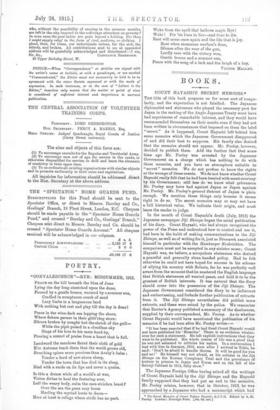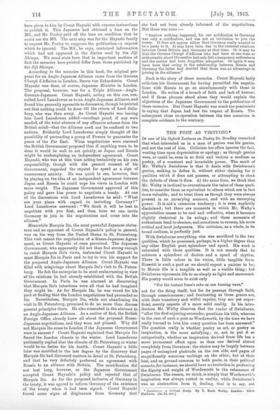BOOKS.
COUNT HAYASHI'S SECRET MEMOIRS.*
THE title of this book prepares us for some sort of irregn• larity, and the expectation is not falsified. The Japanese diplomatist and statesman who played the necessary port for Japan in the making of the Anglo-Japanese Treaty must have had experiences of remarkable interest, and they would have recommended themselves on their merits even if they bad not been written in circumstances that imposed on them the label "secret." As it happened, Count Hayashi left behind him some memoirs which the Japanese Government disapproved of and did their best to suppress. His family also desired that the memoirs should not appear. Mr. Pooley, however, decided to publish them. Add the further fact that some time ago Mr. Pooley was arrested by the Japanese Government on a charge which has nothing to do with these memoirs, and you have an atmosphere suitable to " secret " memoirs. We do not profess to know the rights or the wrongs of these events. We do not know whether Count Hayashi really felt that be had been treated with scant courtesy by his Government; still less do we know what grievances Mr. Pooley may have had against Japan or Japan against Mr. Pooley. Mr. Pooley's general distrust of Japan is plain enough. - We mention these things only because it seems right to do so. The secret memoirs may or may not have a full historical 'value. We indicate their origin, and must leave the reader to judge.
In the month of Count Hayashi's death (July, 1913) the Japanese newspaper Jiji Shimpo began the serial publication of his diary. Count Hayashi, who had always recognized the power of the Press and understood how to control and use it, had been in the habit of making communications to the Jiji Shimpo, as well as of writing for it, just as Bismarck associated himself in particular with the Hamburger Nachrichten. The comparison must not be accepted in any sinister sense; Count Hayashi was, we believe, a scrupulous statesman who desired a peaceful and generally clean-banded policy. Had he felt otherwise he could not have hoped for success in his scheme of allying his country with Britain, for he was perfectly well aware from the moment that he mastered the English language
that British statesmen all wanted peace, and held it to be the greatest of British interests. It was natural that the diary
should come into the possession of the Jiji Shimpo. The Japanese Government considered the diary to be indiscreet and embarrassing, and forbade further publication of extracts from it. The Jiji Shimpo nevertheless did publish more extracts, and these were seized by the police. We remember that Reuter's Agency published a summary of the disclosures, supplied by their correspondent, Mr. Pooley. As to whether Count Hayashi would have sanctioned the publication of his memoirs if he bad been alive Mr. Pooley writes :— "It has been asserted that if he had lived Count Hayashi would not have published his 'Memoirs.' There is no evidence whatso- ever for such a statement. He left explicit instructions that they were to be published. His whole course of life was a proof that he was not ashamed to criticize his nation. In a conversation I had with him in January, 1912, soon after I arrived in Tokio, he said: ' Don't be afraid to handle thorns. It will be good for you and us I' He himself was not afraid, as his articles in the Jiji Shimpo on the Korean Conspiracy Trial and the provolone() of torture in prisons in Japan and Korea and on the fall of the Saionji Cabinet in 1912, fully show."
The Japanese Foreign Office having seized all the writings of Count Hayashi held by the Jiji Shimpo and the Hayashi family supposed that they had put an end to the memoirs. Mr. Pooley relates, however, that in October, 1913, he was approached by a Japanese who had a manuscript which had • The Secret Memoirs of Count Tadasu Hayashi, 13.C.V.O. Edited by A. M. Pooley. London: Eveloigh Nash. [10s. 6.1. not.1 been given to him by Count Hayashi with express instructions to publish it. This Japanese had obtained a loan on the MS., and Mr. Pooley paid off the loan on condition that he could use the MS. The next step was for the Hayashi family to request Mr. Pooley to suppress the publication—a request which he ignored. The MS., he says, contained information which had not appeared in the diaries used by the .Tiji Shimpo. We must state here that in important matters of fact the memoirs here printed differ from those published by the .7iji Shimpo.
According to the memoirs in this book, the original pro- posal for an Anglo-Japanese Alliance came from the German Charge d'Affaires in London, Baron von Eckardatein. Count Hayashi was then, of course, Japanese Minister in London. The proposal, however, was for a Triple Alliance—Anglo- German-Japanese. Count Hayashi, acting on this cue, con- sulted Lord Lansdowne as to an Anglo-Japanese Alliance, and found him generally agreeable to discussion, though he pointed out that nothing could be done till the return of Lord Salis- bury, who was then away. As Count Hayashi was leaving him Lord Lansdowne added—excellent proof, if any were needed, of the total absence of any offensive scheme from the British mind—that the Alliance need not 'be confined to two nations. Evidently Lord Lansdowne simply thought of the possibility of persuading a group of Powers to guarantee the peace of the Far East. When negotiations were resumed the British Government proposed that if anything were to be done it would be well to act quickly, as Japan and Russia might be contemplating an independent agreement. Count Hayashi, who was at this time acting tentatively on his own responsibility, though with the general consent of his Government, regarded the request for speed as a sign of unnecessary anxiety. He was quick to see, however, that by playing on the idea of an independent agreement between Japan and Russia he could urge his views in London with more weight. The Japanese Government approved of this policy and gave him power to negotiate a treaty. At one of the discussions with Lord Lansdowne he said: "What are your plans with regard to including Germany P" Lord Lansdowne answered : " We think it will be best to negotiate with you first, and then later we can invite Germany to join in the negotiations and come into the alliance."
Meanwhile Marquis Ito, the most powerful Japanese states- man and an opponent of Count Hayashi's policy in general, was on his way from the United States to St. Petersburg. This visit meant the negotiation of a Russo-Japanese Agree- ment, as Count Hayashi at once perceived. The Japanese Government, who apparently did not then feel strong enough to resist Marquis Ito's views, instructed Count Hayashi to meet Marquis Ito in Paris and to try to win his support for the proposed Anglo-Japanese Alliance. Count Hayashi was filled with misgivings about Marquis Ito's visit to St. Peters- burg. He felt the enterprise to be most embarrassing in view of the relations he had already established with the British Government. In Paris he was alarmed at discovering that Marquis Ito's intentions were all that he had imagined they might be. As for Marquis Ito, he was vexed for his part at finding that the London negotiations bad proceeded so far. Nevertheless, Marquis Ito, while not abandoning his visit to St. Petersburg, promised to do no more than discuss general principles there. He also consented in the abstract to an Anglo-Japanese Alliance. As a matter of fact, the British Foreign Office already knew all about the proposed Russo- Japanese negotiations, and they were not pleased. Why did not Marquis Ito come to London if the Japanese Government were in earnest P Count Hayashi explained that Marquis Ito feared the London climate in the winter. Lord Lansdowne pertinently replied that the climate of St. Petersburg in winter would be no better for his health. Count Hayashi a little later was mortified to the last degree by the discovery that Marquis Ito had discussed matters in detail at St. Petersburg, and that be very definitely preferred an agreement with Russia to an alliance with Britain. The mortification did not last long, however, as the Japanese Government accepted Count Hayashi's policy and rejected that of Marquis Ito. As for the proposed inclusion of Germany in the treaty, it was agreed to inform Germany of the existence of the treaty when it had been signed. Count Hayashi feared some signs of displeasure from Germany that
she had not been already informed of the negotiations. But there was none :—
"Anyhow nothing happened, for our notification to Get-many was only a notification, and was not an invitation to join the treaty. It does not appear either that Germany really wanted to be a party to it. It may have boon due to the strained relations between Great Britain and Germany at that time. Or it may be that the German Chargo d'Affaires who had been at one time so enthusiastic about the matter had only felt a temporary enthusiasm and the matter had boon forgotten altogether. Or again it may have been that owing to the relationship between Russia and Germany the latter had decided that there was no advantage in joining in the alliance."
Such is the story of these memoirs. Count Hayashi hotly criticizes his Government for having permitted the negotia- tions with Russia to go on simultaneously with those in London. He writes of a breach of faith and lack of honour, and if those phrases stood alone they would explain the objections of the Japanese Government to the publication of these memoirs. But Count Hayashi was much too pessimistic in saying that Japan had lost the respect of Russia. The subsequent close co-operation between the two countries is complete evidence to the contrary.



































 Previous page
Previous page